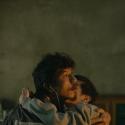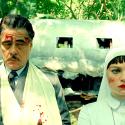Films in which poetry is almost a character can often become bombastic, but there’s no danger of that in Bruno Barreto’s Reaching for the Moon, whose heroine is the repressed, rather quiet American poet Elizabeth Bishop (Miranda Otto): speaking loudly, we feel, was little in her character, even when she was in her cups (which she quite often is in this deluxe Brazilian English-language biopic).
Barreto’s film is about Bishop’s complicated 15-year relationship with the affluent Brazilian architect Lota de Macedo Soares (Glória Pires), who is the exact opposite of her partner – she’s forthright, and determined to get what she wants. It begins in 1951, when Bishop, then 40 and in the creative doldrums, decided on a trip south. Her first stop is with an old college friend Mary (Tracy Middendorf), who's in a relationship with Lota, in the luxuriantly landscaped surroundings of Petropolis (which was, incidentally, the final destination for Stefan Zweig), outside Rio. That intended short stay turns into a much more protracted sojourn, as Bishop is seduced, first by Lota and then by the sensual atmosphere of Brazil itself; some of the poet’s finest work came from that decade.
Mauro Pinheiro’s opulent widescreen lensing speaks for itself
But it was a troubled relationship: the impetuous Lota was a workaholic, while Bishop’s drinking became increasingly dominant. Nor did Mary ever disappear off the scene, driven instead by her love for Lota, and by Lota herself, to foster a child (in a strange scene of almost do-it-yourself adoption) and devote herself to that family life on the sidelines. We see Lota’s career developing, aided by helpful friends in government places (until an upheaval in Brazilian politics), culminating in her masterwork, Rio’s Flamengo Park. (The film’s title alludes to the high-column lighting to be found there – though its mood might be better caught by the words from one of Bishop’s poems, “the art of losing”, with which the film was originally conceived).
For there is a lot of losing here – some of it explained (though with little background) by circumstances from the past, Lota’s estrangement from her father, and Bishop’s memories of her mother’s madness. And after all the luxuriance of Rio, this was a relationship that came to a grey, silent end with Lota’s suicide (following depressions and hospitalization at home) on a visit to Bishop in New York in 1967. Carolina Kotscho and Matthew Chapman’s script, based on a double biography titled appropriately “Rare and Commonplace Flowers”, is tight and engagingly witty when wit is required, and allows Bishop’s poetry to speak for itself when called on. Performances from the central duo are outstanding. This dvd release comes with a “Making of” featurette, and an interesting interview with Barreto. Mauro Pinheiro’s opulent widescreen lensing speaks for itself.
Overleaf, watch the trailer for Reaching for the Moon













Add comment